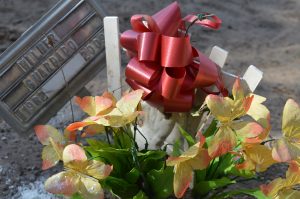
This was our 5th trip to TX. In 2013 we were invited to do exhumations in the Sacred Heart Burial Park side by side Dr. Lori Baker and her students from Baylor University. Like every long term project, there are lessons learned as progress occurs. Towards the end of that first field season we had a concern that the excavations were not going deep enough and were not being systematically conducted in all quadrants. But we moved to a different area of the cemetery in 2014. That year we were able to work more collaboratively with Baylor University and were allowed a leadership role in the cemetery where we supervised the exhumations. We made sure each quadrant was systematically excavated and explored to a standard depth below the ground surface. In 2015 and 2016, we were invited to conduct skeletal analyses on the individuals who had been removed from the cemetery and were being housed at Texas State University until identification and repatriation. As leadership of the project was transferred to Dr. Kate Spradley at Texas State University under Operation identification, we were honored to once again be invited to assist in exhuming the remaining unidentified burials in Sacred Heart.
For five years we have been working to exhume and identify migrants who perished in Brooks County, TX. For five years individuals from a variety of university, governmental and nongovernmental agencies have been working to reduce the number of deaths and identify those who lost their lives in Brooks County. Countless people, volunteers, hours, days, weeks, years and dollars have gone towards assisting one county during this humanitarian crisis (and there are more).
We thought this would be our last year of exhumations in Brooks County. We started in a third area of the cemetery that contained six markers for unidentified individuals. There was one more marker near the area exhumed in our second field season (area 2). As we began to work we were soon informed by community members who worked in or frequented the cemetery that there were more areas that needed our attention. After the 6 from area 3 were completed we split up into three groups: two Texas State groups working on area 2 and a new area (4) and one UIndy group going back to area 1. When we got to area 1 we were greeted by Wilmer’s marker. Wilmer was buried in a quadrant worked on by the UIndy team in 2013. Even back then we wondered about Wilmer: Was he a migrant? How was he identified? Where is he from? Was there any attempt to notify his family? Does anyone know he is here? Now we find ourselves back in that same area of the cemetery 4 years later and are still wondering about Wilmer. We proceeded to re-excavate the area but were careful to not disturb Wilmer. We did found additional burials in this area, as well as bundles of personal effects. Four more individuals will now be able to start their journeys towards identification. But I can’t help but wonder about Wilmer. As we were leaving we made sure to put new flowers at Wilmer’s marker.
We went to Sacred Heart with the hopes of recovering 7 individuals and we ended up recovering 24. And there are more. The work continues on a daily basis by many people across TX and beyond. Their dedication to identifying these individuals is extraordinary. I am proud that the UIndy team was able to contribute to the efforts and hope we are invited to continue working towards these identification and repatriation efforts.
